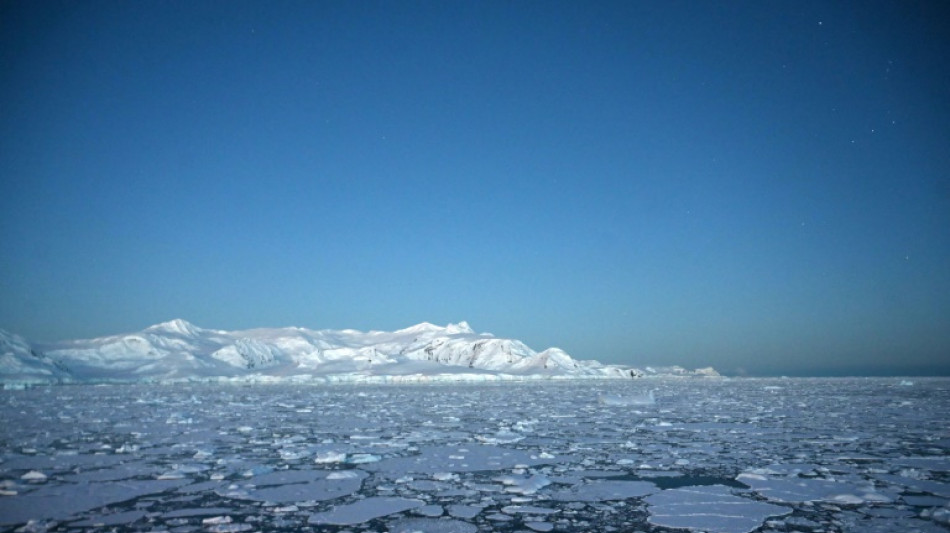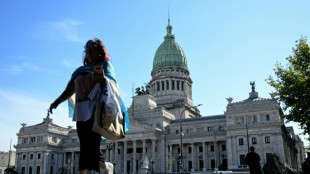
-
 Rocket re-entry pollution measured in atmosphere for first time
Rocket re-entry pollution measured in atmosphere for first time
-
Airbus ready to build two new European fighters if countries want

-
 Canada makes push to attract skilled migrants, including for defence
Canada makes push to attract skilled migrants, including for defence
-
US threatens to leave IEA if net zero focus remains

-
 Walmart outlines big AI ambitions as it reports mixed results
Walmart outlines big AI ambitions as it reports mixed results
-
Trump kicks off his 'Board of Peace,' as war clouds loom on Iran

-
 UK pubs to stay open late if home nations reach World Cup knockouts
UK pubs to stay open late if home nations reach World Cup knockouts
-
TotalEnergies in high-stakes French trial over climate change

-
 Bosnia probes fascist salutes at Croatian singer's concert
Bosnia probes fascist salutes at Croatian singer's concert
-
US and Israel issue dire warnings to Iran alongside US military buildup

-
 British public cheer Andrew's arrest with a smile and relief
British public cheer Andrew's arrest with a smile and relief
-
Argentine workers go on strike to protest Milei's labor reforms

-
 Nakai targets Olympic skating upset as 'skimo' makes debut
Nakai targets Olympic skating upset as 'skimo' makes debut
-
What we know about ex-prince Andrew's friendship with Epstein

-
 US trade deficit in goods widens to new record in 2025
US trade deficit in goods widens to new record in 2025
-
Oil extends gains on US-Iran tensions, stocks retreat

-
 Williams 'on the back foot' after missing Barcelona: Albon
Williams 'on the back foot' after missing Barcelona: Albon
-
Real Madrid submit evidence to UEFA in Vinicius racism probe

-
 Olympics rev up Milan's renewal but locals fear price to pay
Olympics rev up Milan's renewal but locals fear price to pay
-
Cardona Coll, Fatton win Olympic-debuting ski mountaineering sprint golds

-
 MSF will keep operating in Gaza 'as long as we can': mission head
MSF will keep operating in Gaza 'as long as we can': mission head
-
Russian Filippov wins first medal at Milan-Cortina Games for individual neutral athletes

-
 Italian Milan takes sprint honours at UAE Tour
Italian Milan takes sprint honours at UAE Tour
-
Dozens killed in jihadist attacks in northwest Nigeria

-
 Zimbabwe unbeaten in T20 World Cup after six-wicket Sri Lanka win
Zimbabwe unbeaten in T20 World Cup after six-wicket Sri Lanka win
-
Postecoglou admits taking Nottingham Forest post a 'bad decision'

-
 Switzerland's Fatton wins women's ski mountaineering sprint on Olympic debut
Switzerland's Fatton wins women's ski mountaineering sprint on Olympic debut
-
Kinghorn, Van der Merwe return for Scotland against Six Nations strugglers Wales

-
 Repsol says could boost Venezuela oil output over 50% in 12 months
Repsol says could boost Venezuela oil output over 50% in 12 months
-
UN says Israeli actions raise 'ethnic cleansing' fears in West Bank, Gaza

-
 Arteta tells faltering leaders Arsenal to harness Wolves 'pain' against Spurs
Arteta tells faltering leaders Arsenal to harness Wolves 'pain' against Spurs
-
Crowley gets nod for Irish as Prendergast drops out

-
 Unbeaten Swiss to meet Great Britain in Olympic men's curling semis
Unbeaten Swiss to meet Great Britain in Olympic men's curling semis
-
UK police arrest ex-prince Andrew on suspicion of misconduct

-
 Oil extends gains on US-Iran tensions, Europe stocks slide
Oil extends gains on US-Iran tensions, Europe stocks slide
-
Former prince Andrew, a historic downfall

-
 Sri Lanka post 178-7 against Zimbabwe ahead of T20 Super Eights
Sri Lanka post 178-7 against Zimbabwe ahead of T20 Super Eights
-
OpenAI's Altman tells leaders regulation 'urgently' needed

-
 US renews threat to leave IEA
US renews threat to leave IEA
-
Liverpool boss Slot says Isak in 'final stages of rehab'

-
 Airbus ready to build two new European fighter jets if 'customers' ask
Airbus ready to build two new European fighter jets if 'customers' ask
-
UN Sudan probe finds 'hallmarks of genocide' in El-Fasher

-
 Costelow starts, Hamer-Webb makes Wales debut in Six Nations clash with Scotland
Costelow starts, Hamer-Webb makes Wales debut in Six Nations clash with Scotland
-
Facing US warnings, Iran defends right to nuclear enrichment

-
 Ex-South Korea leader Yoon gets life in prison for insurrection
Ex-South Korea leader Yoon gets life in prison for insurrection
-
OpenAI's Altman says at India summit regulation 'urgently' needed

-
 British couple held in Iran sentenced to 10 years
British couple held in Iran sentenced to 10 years
-
West Indies ease past Italy to tune up for T20 Super Eights

-
 At least 16 killed after building collapses in Pakistan following blast
At least 16 killed after building collapses in Pakistan following blast
-
Summit photo op fails to unite AI startup rivals


Record low Antarctic sea ice extent could signal shift
Sea ice around Antarctica shrank to the smallest extent on record in February, five years after the previous record low, researchers said Tuesday, suggesting Earth's frozen continent may be less impervious to climate change than thought.
In late February, the ocean area covered by ice slipped below the symbolic barrier of two million square kilometres (around 772,000 square miles) for the first time since satellite records began in 1978, according to a study in the journal Advances in Atmospheric Sciences.
Researchers found that the key driver of ice loss was change in temperature, though shifts in ice mass also played a lesser role.
Both the North and South pole regions have warmed by roughly three degrees Celsius compared to late 19th-century levels, three times the global average.
Antarctica encountered its first recorded heatwave in 2020, with an unprecedented 9.2C above the mean maximum, and in March a research centre in eastern Antarctica saw temperatures soar 30 degrees above normal.
But extreme aberrations of this kind are recent.
Unlike sea ice in the Arctic, which has diminished by three percent a year since the late 1970s, sea ice in Antarctica expanded over the same period by one percent per decade, albeit with large annual variations.
Ice cover during this year's austral summer shrank most around West Antarctica, which has been more vulnerable to global warming than the far larger East Antarctica.
- Sea-ice budget -
Melting sea ice has no discernable impact on sea levels because the ice is already in ocean water.
But diminished ice cover is nonetheless a major concern because it helps accelerate global warming, explained co-author Qinghua Yang, a professor at Sun Yat-sen University in Guangzhou.
When white sea ice -- which bounces the Sun's energy back into space -- is replaced by dark, unfrozen sea, "there is less reflection of heat and more absorption," he said in a statement.
"This in turn melts more sea ice, producing more absorption of heat, in a vicious circle."
Pristine snow and ice reflect more than 80 percent of the Sun's energy back into space whereas open ocean absorb the same percentage.
Startlingly, the record low 1.9 million square kilometres on February 25 was 30 percent below the 1981-2010 average. The previous record was just over two million square kilometres in 2017.
Maximum sea ice extent in Antarctica has averaged about 18 million square kilometres in recent years.
To analyse the causes of this year's record ice loss, researchers examined Antarctica's "sea-ice budget" -- ice added and ice lost, year by year -- as well as daily sea-ice drift, or movement.
"In summer, thermodynamic" -- or temperature-related -- "processes dominate the sea melting through poleward heat transport," the study concluded.
The record minimum sea ice extent in the Arctic -- 3.4 million square kilometres -- occurred in 2012, with the 2nd and 3rd lowest ice-covered areas in 2020 and 2019, respectively. Maximum sea ice extent has averaged about 15 million square kilometres.
Ice sheets atop West Antarctica hold the equivalent of six metres of sea level rise, where as East Antarctica's massive glaciers would raise global oceans by more than 50 metres.
F.Bennett--AMWN


